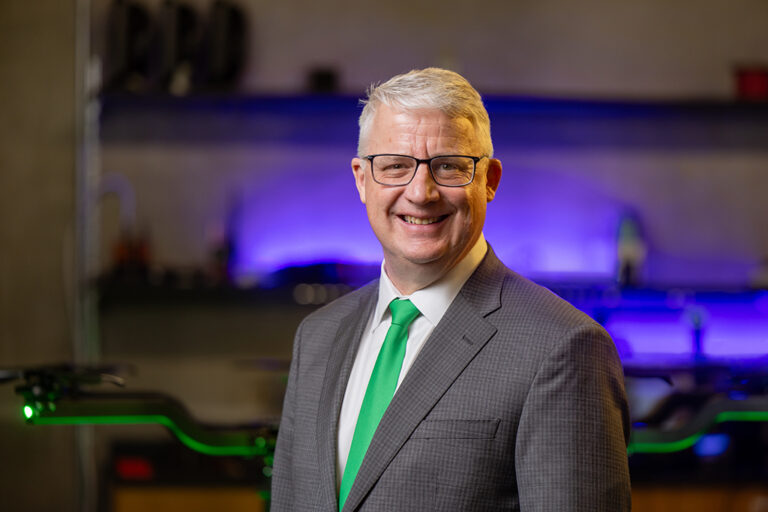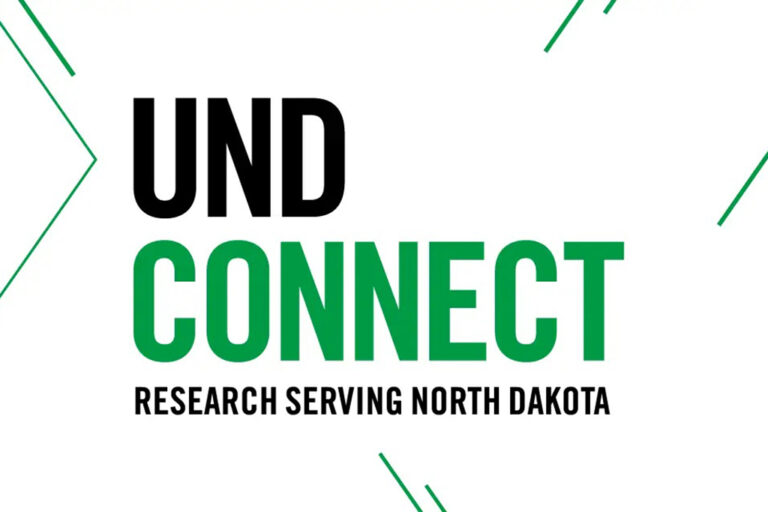Finding the ‘essential’ meaning
UND Capstones encourage UND students to transcend gen-ed mindset to make connections to their majors, future careers

Kaylee Schell has her finger on the pulse of her future.
The senior mathematics major from Minot, N.D. wants to be the one who keeps the blood flowing when a heart has stopped. She plans to go to graduate school to be a perfusionist, and she’s also learning how to explain her goal to others.
“When someone has open heart surgery, a perfusionist works at a bypass machine,” Schell said, standing in front of a poster filled with photos and diagrams. “The heart needs to stop so the surgeon can fix it. This machine flows just like your heart would, so your whole body—your organs, your cells and your tissues — remain oxygenated and can survive, but the heart can stand still to be repaired.”
Schell was one of dozens of students filling UND’s Memorial Union for the Essential Studies (ES) Capstone Showcase Dec. 8. The event features research by juniors and seniors in Capstone classes, which act as final projects or “mini-theses” for undergraduates. This is the third showcase that Director of Essential Studies Ryan Zerr, also a mathematics professor, has helped coordinate.
“The concept behind the showcase was providing a service to faculty teaching Essential Studies Capstones in which they could offer students a venue to show off their senior project work and get a chance to talk about it to people who may or may not be acquainted with the discipline,” Zerr said.
Chemistry senior Quintin Elliott, Albertville, Minn., described his scientific discovery at the expo. His Capstone project focused on finding an efficient and green way to create monomers (molecules that bond to other identical molecules to form a polymer) to help replace petroleum-based plastics.
“If I can find a way to simply and easily explain this to someone who doesn’t understand chemistry, I can easily go into a symposium full of chemists and know that I can explain it to them,” Elliott said.

Connect to majors
UND’s Capstone courses are one of the requirements of the University’s ES program, which is intended to help students achieve a high degree of learning in six goal areas— intercultural knowledge and skills, critical inquiry and analysis, oral communication, written communication, information literacy and quantitative reasoning.
“The idea is the student walks out the door after they graduate with a content knowledge in their major, but also with more broadly applicable intellectual skills that come from general education,” Zerr said.
Since Zerr was named Director of Essential Studies in 2015, he has been working to change the way students and faculty perceive the “gen-ed” requirement. A 2014 program review found many students thought they were being forced to take extraneous courses with no connection to their majors.
Zerr wants to help undergrads make those connections. The Capstone Showcase was the first step, and he also hopes to create more thematic course pathways for students as well as direct communications that explain the importance of individual class selections.
“It would essentially say, ‘hey, you’re taking Math 103. I’m sure you’re aware that’s an Essential Studies course. It will focus on the learning goal of quantitative reasoning. Did you know that in a recent survey, employers identify this type of skill to be crucial to their employees’ success?’ — So you’re pulling in these helpful tidbits and being in-your-face about it,” Zerr said.
Zerr also wants to expand the showcase this spring by opening it up to all undergraduate projects and research, not just Capstones.
“It would be more expansive to include musical performances, a theater arts connection, an art exhibition and more, along with the more standard poster presentations,” he said.
Program assessment
The ES committee has begun an assessment system to determine if the program is producing the necessary student outcomes. A sampling of Capstone students are presented with a real-world critical thinking scenario and are asked to produce a product, like a memo or video, that responds to the issue. The outcome is then scored by a faculty group.
“It represents a way to be as careful, thoughtful and intentional as possible about whether the ES program is doing what we want it to, and to use those conclusions to thoughtfully make changes if warranted,” Zerr said.
But for students like Schell, the ES program is about more than learning outcomes — it’s about new experiences.
“When you’re 18 and you come to college, you’re expected to decide what you’re going to do with the rest of your life,” Schell said. “Essential Studies courses open doors and you can get an idea of what’s out there. It’s nice to have that diversity.”


